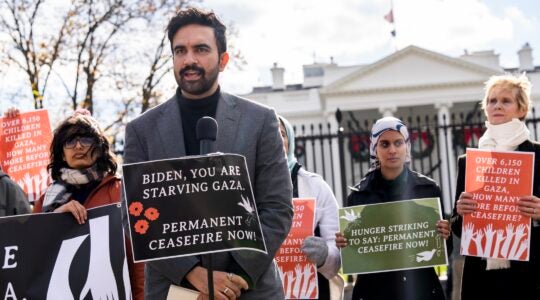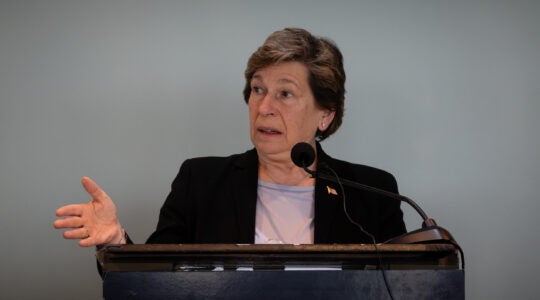WASHINGTON (JTA) — The Trump administration in a statement said it “sympathizes deeply” with the families whose lawsuit against the Palestine Liberation Organization may soon be considered by the Supreme Court, but continues to maintain that the lawsuit does not meet the standards for review by the high court.
“The United States condemns acts of terror in the strongest terms and the Department of Justice is committed to prosecuting those who commit terrorist attacks against innocent human beings to the fullest extent that the law allows,” said a statement emailed this week to JTA by a Justice Department spokeswoman.
“The United States sympathizes deeply with the American families who, in 2004, sued the Palestinian Authority and the Palestine Liberation Organization for acts of terrorism committed against their loved ones between 2002 and 2004,” the statement said. “The court of appeals decided, however, that the suit was not consistent with due process under the Constitution, and its decision does not meet the usual standards for Supreme Court review.”
The Supreme Court will say by March 29 whether it will consider the appeal by the litigants in the case known as Sokolow v. Palestine Liberation Organization. The plaintiffs won $656 million in a 2015 federal jury verdict, but it was overturned a year later by an appellate court.
A filing by the solicitor general last month siding with the PLO drew rebukes from conservatives, including some of the Trump administration’s most steadfast Jewish community defenders.
Solicitor General Noel Francisco supported the appellate court’s finding in a Supreme Court filing last month, mostly on technical grounds.
The lead plaintiff, Mark Sokolow, his wife and two of his daughters were injured in a Jerusalem suicide bombing in 2002 that killed an 81-year-old man. His fellow plaintiffs are families of victims of terrorist attacks in Israel that killed 33, including several Americans, and wounded over 450. Their suit argued that the late PLO Chairman Yassir Arafat had paid attackers and their families.
The plaintiffs this week filed a response to the solicitor general arguing that the Supreme Court should consider the case if only because it is undergirded by the Anti-Terrorism Act, a law passed by Congress in 1992 that specifically targets perpetrators of terrorist attacks overseas.
“The Anti-Terrorism Act is an important, thoughtfully considered, congressional effort to defend United States citizens from international terrorism,” the filing said. “At the very minimum, this law is entitled to consideration in this Court in the face of the Second Circuit’s constitutional decision stripping it of its core purpose and meaning.”
Lawmakers in Congress from both parties have urged the Trump administration to back the plaintiffs.
“Congress passed the Anti-Terrorism Act to hold accountable dangerous entities for acts of terrorism,” Sen. Chuck Schumer, D-N.Y., the minority leader, said in a statement emailed this week to JTA.
“In the case of Mark Sokolow, the judge and jury found the Palestinian Authority and the PLO guilty in the heinous attack that maimed and killed dozens, including our fellow Americans,” Schumer said. “Despite this, the Trump administration has urged the Supreme Court to not take up this case – a move that goes against the well-decided verdict that would hold accountable the Palestinian Authority and PLO for this repugnant terror attack.”
The Zionist Organization of America, a group that has come to the defense of President Donald Trump when he and some of his top staffers have been accused of insensitivity toward Jews, has been at the forefront of expressions of outrage at the solicitor general’s filing.
In a March 7 statement, the ZOA said the Trump administration’s argument “hurts the American terror victims, aids and comforts terrorists, and makes them less concerned about facing consequences for their hideous actions.”
JTA has documented Jewish history in real-time for over a century. Keep our journalism strong by joining us in supporting independent, award-winning reporting.






